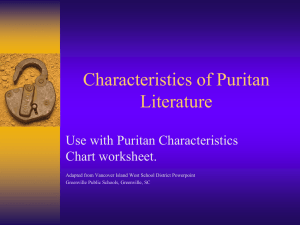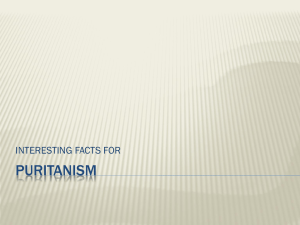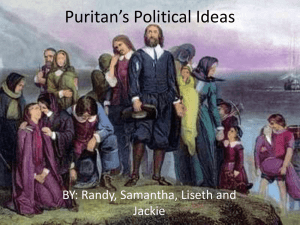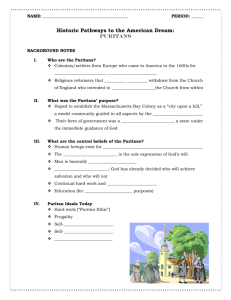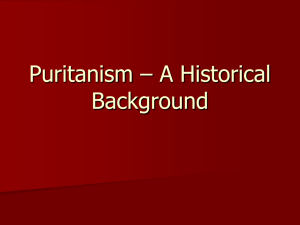Puritanism: Definition, Beliefs, and History
advertisement
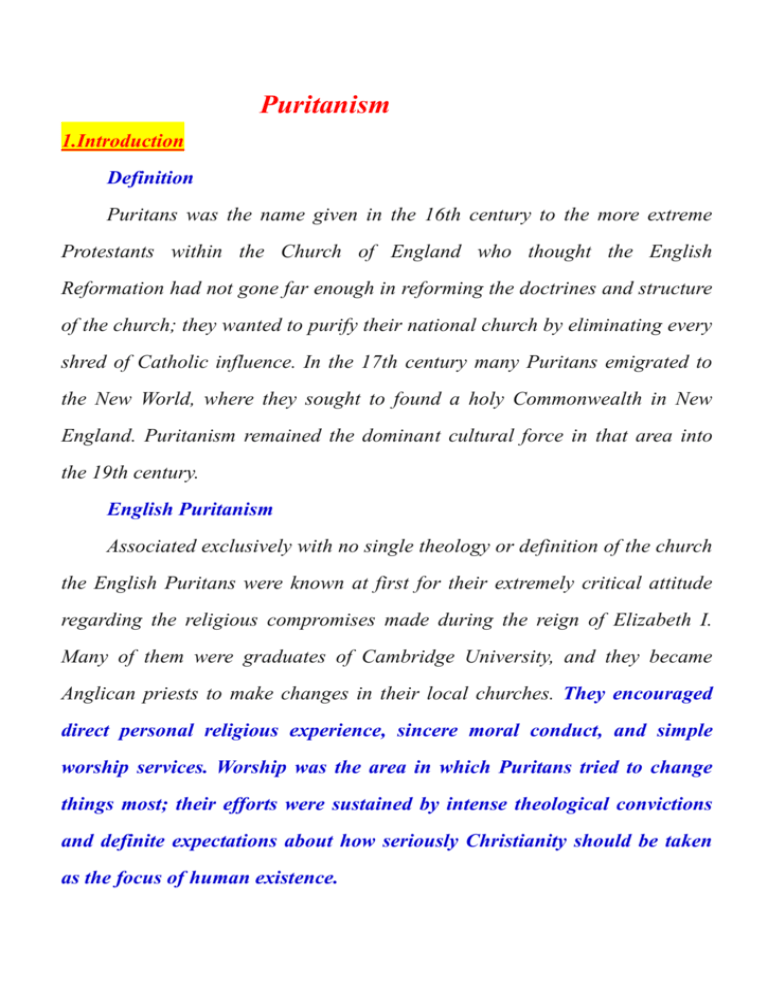
Puritanism 1.Introduction Definition Puritans was the name given in the 16th century to the more extreme Protestants within the Church of England who thought the English Reformation had not gone far enough in reforming the doctrines and structure of the church; they wanted to purify their national church by eliminating every shred of Catholic influence. In the 17th century many Puritans emigrated to the New World, where they sought to found a holy Commonwealth in New England. Puritanism remained the dominant cultural force in that area into the 19th century. English Puritanism Associated exclusively with no single theology or definition of the church the English Puritans were known at first for their extremely critical attitude regarding the religious compromises made during the reign of Elizabeth I. Many of them were graduates of Cambridge University, and they became Anglican priests to make changes in their local churches. They encouraged direct personal religious experience, sincere moral conduct, and simple worship services. Worship was the area in which Puritans tried to change things most; their efforts were sustained by intense theological convictions and definite expectations about how seriously Christianity should be taken as the focus of human existence. After James I became king of England in 1603, Puritan leaders asked him to grant several reforms. At the Hampton Court Conference (1604), however, he rejected most of their proposals, which included abolition of bishops. Puritanism gained much popular support early in the 17th century. The government and the church hierarchy became increasingly repressive, causing many Puritans to emigrate. Those who remained formed a powerful element within the parliamentarian party that defeated Charles I in the English Civil War. After the war the Puritans remained dominant in England until 1660, but they quarreled among themselves (Presbyterian dominance gave way to Independent, or congregational, control under Oliver Cromwell) and proved even more intolerant than the old hierarchy. The restoration of the monarchy (1660) also restored Anglicanism, and the Puritan clergy were expelled from the Church of England under the terms of the Act of Uniformity (1662). Thereafter English Puritans were classified as Nonconformists. American Puritanism Early in the 17th century some Puritan groups separated from the Church of England. Among these were the Pilgrims, who in 1620 founded Plymouth Colony. Ten years later, under the auspices of the Massachusetts Bay Company, the first major Puritan migration to New England took place. The Puritans brought strong religious impulses to bear in all colonies north of Virginia, but New England was their stronghold, and the Congregationalist churches established there were able to perpetuate their viewpoint about a Christian society for more than 200 years. Richard Mather and John Cotton provided clerical leadership in the dominant Puritan colony planted on Massachusetts Bay. Thomas Hooker was an example of those who settled new areas farther west according to traditional Puritan standards. Even though he broke with the authorities of the Massachusetts colony over questions of religious freedom, Roger Williams was also a true Puritan in his zeal for personal godliness and doctrinal correctness. Most of these men held ideas in the mainstream of Calvinistic thought. In addition to believing in the absolute sovereignty of God, the total depravity of man, and the complete dependence of human beings on divine grace for salvation, they stressed the importance of personal religious experience. These Puritans insisted that they had the duty to direct national affairs according to God's will as revealed in the Bible. This union of church and state to form a holy commonwealth gave Puritanism direct and exclusive control over most colonial activity until commercial and political changes forced them to relinquish it at the end of the 17th century. Because of its diffuse nature, when Puritanism began to decline in America is difficult to say. Some would hold that it lost its influence in New England by the early 18th century, but Jonathan Edwards and his able disciple Samuel Hopkins revived Puritan thought and kept it alive until 1800. Others would point to the gradual decline in power of Congregationalism, but Presbyterians under the leadership of Jonathan Dickinson and Baptists led by the example of Isaac Backus revitalized Puritan ideals in several denominational forms through the 18th century. During the whole colonial period Puritanism had direct impact on both religious thought and cultural patterns in America. In the 19th century its influence was indirect, but it can still be seen at work stressing the importance of education in religious leadership and demanding that religious motivations be tested by applying them to practical situations. 2 Basic beliefs of the Puritans Puritanism generally extended the thought of the English Reformation, with distinctive emphases on four convictions: 1) that personal salvation was entirely from God, Total Depravity - through Adam and Eve's fall, every person is born sinful - concept of Original Sin. They accepted the doctrine of predestination, original sin and total depravity. They considered that man was born sinful, was a sinner and could note redeem his original sin.“In Adam’s fall, we all sin.” The Puritans believed that humankind was utterly dependent upon God for salvation. With their predecessors in England and with Luther and Calvin they believed that reconciliation with God came as a gift of his grace received by faith. They were Augustinians who regarded humans as sinners, unwilling and unable to meet the demands, or to enjoy the fellowship, of a righteous God apart from God's gracious initiative. But Puritans also made distinctive contributions to the general Reformed idea of salvation. They advocated a "plain style" of preaching, as exemplified in the masterful sermons of John Dod (1555 - 1645) and William Perkins (1558 - 1602), which was consciously designed to point out simply the broad way of destruction and the strait gate to heaven. They also placed a new emphasis on the process of conversion. In the journals and diaries of leaders like Thomas Shepard they charted the slow, and often painful, process by which God brought them from rebellion to obedience. They also spoke of salvation in terms of "covenant." In the notes to the Geneva Bible, the translation of proto - Puritans completed during the reign of Mary Tudor, emphasis was on a personal covenant of grace, whereby God both promised life to those who exercised faith in Christ and graciously provided that faith, on the basis of Christ's sacrificial death, to the elect. Later Puritans expanded the idea of covenant to take in the organization of churches, seen most clearly in the rise of Congregationalism (or Independency) and the structuring of all society under God, of which the "Holy Commonwealths" of Massachusetts and Connecticut were the major examples. 2) that the Bible provided the indispensable guide to life, Unconditional Election - God "saves" those he wishes - only a few are selected for salvation - concept of predestination. Man did not know whether they could be God’s chosen people, but should live a saint-like life at ordinary times according to God’s will. The Holy Bible was the guidebook to man’s behaviors. With the early English Reformers the Puritans believed, second, in the supreme authority of the Bible. The use of Scripture, however, soon came to be a great cause of offense between Puritans and their Anglican opponents and among Puritans themselves. Puritans, Anglicans, and the many in between all believed in the Bible's final authority. But Puritans came to argue that Christians should do only what the Bible commanded. Anglicans contended rather that Christians should not do what the Bible prohibited. The difference was subtle but profound. Among Puritans considerable differences eventually appeared over what Scripture demanded, especially in questions relating to the church. Some (mostly in England) contended for a Presbyterian state - church organization, others supported a congregational organization in league with the state, while still others believed that the Bible mandated congregational churches separate from the state. In short, Puritans disagreed with Anglicans about the way to interpret the Bible, but they differed among themselves about which biblical interpretations were best. The former disagreement dominated English religious life so long as the king and his Episcopalian allies were in control. The latter came to the fore after the success of the Puritan Revolution, and it led to the disintegration of Puritanism in England. These disagreements should not hide the Puritans' overriding commitment to the authority of Scripture. They made as serious an attempt as has ever been made in the English - speaking world to establish their lives on the basis of biblical instruction. When Puritan efforts to reform the kingdom of England faltered in the last years of Elizabeth's reign, they turned to the one sphere they could still control, their individual families. It was during this period around 1600 that Puritans began to place new emphasis on the Sabbath, to revive family worship, and to encourage personal acts of mercy to the sick and dying. When Puritan prospects brightened in the 164os, this "spiritualization of the household" emerged into the open. 3) that the church should reflect the express teaching of Scripture Limited Atonement - Jesus died for the chosen only, not for everyone. Puritanism encouraged people to struggle in their career. If one’s business was booming, it proved that he had gained god’s providence. Puritans meant to prove that they were God’s chosen people, enjoying his blessing on this earth as in heaven. Irresistible Grace - God's grace is freely given, it cannot be earned or denied. Grace is defined as the saving and transfiguring power of God. Puritans dreamed of living under a perfect order and worked with indomitable courage and confident hope toward building a new Garden of Eden in America, where man could at long last live the way he should. Puritans believed, third, that the church should be organized from Scripture. Anglicans contended that episcopacy, since it was tried and tested by time and did not violate any command of Scripture, was a godly and appropriate way of organizing the church. Puritans responded that the defenders of episcopacy missed the point, for they neglected to follow the positive teachings of the Bible. Puritans argued that Scripture laid down specific rules for constructing and governing churches. Furthermore, the Bible taught a system of church order that was not based on bishops. Puritans maintained this conviction even when they failed among themselves to agree on what that biblical system was. But even these disagreements were fruitful, for they grounded the modern polity of Presbyterians, Congregationalists, and Baptists as well. 4) that society was one unified whole Perseverance of the "saints" - those elected by God have full power to interpret the will of God, and to live uprightly. If anyone rejects grace after feeling its power in his life, he will be going against the will of God something impossible in Puritanism. Puritans stressed hard work, thrift, piety and sobriety. In people’s daily life, religious activities were a matter of first importance and all others should serve the religion. Their lives were disciplined and hard. The reason that Puritan beliefs concerning salvation, Scripture, and the church created such upheaval was their fourth basic conviction, that God had sanctioned the solidarity of society. Most Puritans believed that a single, coordinated set of authorities should govern life in society. The result was that Puritans sought nothing less than to make all England Puritan. Only late during the Puritan Commonwealth did ideas of toleration and of what is known today as pluralism arise, but these ideas were combated by most Puritans themselves and firmly set to rest for another generation by the restoration of Charles II. From a modern vantage point the intolerance entailed by a unified view of society has harmed the Puritans' reputation. From a more disinterested perspective it is possible also to see great advantages. The Puritans succeeded in bursting the bonds of mere religiosity in their efforts to serve God. Puritanism was one of the moving forces in the rise of the English Parliament in the early seventeenth century. For good and for ill, it provided a foundation for the first great political revolution in modern times. It gave immigrants to Massachusetts a social vision whose comprehensively Christian character has never been matched in America. And, for such a putatively uncreative movement, it liberated vast energies in literature as well. Additional Beliefs Typology: The belief that God's intentions are present in human action and in natural phenomenon. Failure to understand these intentions are human limitations. Puritans believed in cyclical or repetitive history; they use "types" - Moses prefigures Jesus, Jonah's patience is reflected in Jesus' ordeal on the cross, and Moses' journey out of Egypt is played out in the Pilgrims' crossing of the Atlantic. God's wrath and reward are also present in natural phenomena like flooding, bountiful harvest, the invasion of locusts, and the lightening striking a home. Manifest Destiny: The concept of manifest destiny is as old as the first New England settlements. Without using the words, John Winthrop articulated the concept in his famous sermon, the Arbella Covenant (1630), when he said: " ... for we must consider that we shall be as a city upon a hill, the eyes of all people are upon us; ..." Winthrop exhorts his listeners to carry on God's mission and to set a shining example for the rest of the world. From this beginning, the concept has had religious, social, economic, and political consequences. The words manifest destiny were first used by editor John L. O'Sullivan in 1845. The beliefs and practices characteristic of Puritans (most of whom were Calvinists who wished to purify the Church of England of its Catholic aspects) Strictness and austerity in conduct and religion II. The Function of Puritan Writers 1. To transform a mysterious God - mysterious because he is separate from the world. 2. To make him more relevant to the universe. 3. To glorify God. III. The Style of Puritan Writing 1. Protestant - against ornateness; reverence for the Bible. 2. Purposiveness - there was a purpose to Puritan writing - described in Part II above. 3. Puritan writing reflected the character and scope of the reading public, which was literate and well-grounded in religion. IV. Reasons for Puritan Literary Dominance over the Virginians 1. Puritans were basically middle class and fairly well-educated 2. Virginians were tradesmen and separated from English writing. 3. Puritans were children of the covenant; gave them a drive and a purpose to write. V. Common Themes in Early Puritan Writing 1. Idealism - both religious and political. 2. Pragmaticism - practicality and purposiveness. VI. Forces Undermining Puritanism 1. A person's natural desire to do good - this works against predestination. 2. Dislike of a "closed" life. 3. Resentment of the power of the few over many. 4. Change in economic conditions - growth of fishery, farms, etc. 5. Presence of the leaders of dissent - Anne Hutchinson, Roger Williams. 6. The presence of the frontier - concept of self-reliance, individualism, and optimism. 7. Change in political conditions - Massachusetts became a Crown colony. 8. Theocracy suffered from a lack of flexibility. 9. Growth of rationality - use of the mind to know God - less dependence on the Bible. 10. Cosmopolitanism of the new immigrants. VII. Visible Signs of Puritan Decay 1. Visible decay of godliness. 2. Manifestations of pride - especially among the new rich. 3. Presence of "heretics" - Quakers and Anabaptists. 4. Violations of the Sabbath and swearing and sleeping during sermons. 5. Decay in family government. 6. People full of contention - rise in lawsuits and lawyers. 7. Sins of sex and alcohol on the increase. 8. Decay in business morality - lying, laborers underpaid, etc. 9. No disposition to reform. 10. Lacking in social behavior. VIII. Some Aspects of the Puritan Legacy: each has positive and negative implications The need for moral justification for private, public, and governmental acts The Questing for Freedom - personal, political, economic, and social. The Puritan work ethic. Elegiac verse - morbid fascination with death. The city upon the hill - concept of manifest destiny. Study Questions 1. Define some of the basic concepts of Puritan ideology and illustrate their significance in specific works. Choose from among the following: (a) "new world" consciousness, (b) covenant theology, (c) typology, (d) innate depravity, and (e) irresistible grace. A few of the writers who address each of these concepts, and whom you will need to discuss, include (a) Bradford and Bradstreet; (b) Bradford, Wigglesworth, and Edwards; (c) Bradstreet (in Here Follows Some Verses upon the Burning of Our House), Taylor, Winthrop, and Wigglesworth; (d) Taylor, Wigglesworth, and Edwards; and (e) Winthrop and Edwards. 2. Trace the connection between the Puritans' reliance on written covenant in Bradford's [The Mayflower Compact] and their emphasis on didactic to the exclusion of dramatic or personal vision in their literature. 3. Octavio Paz, among others, has called Puritan society a culture based on the principle of exclusion. Discuss, with particular references to literary works, the evidence of this principle in Puritan life and culture. 4. Consider secular consequences of Puritan theology: the Puritans' attitudes toward Native Americans, ordinary life, witches, house servants, slavery, and infant damnation. Choose two of these topics and explore their treatment in literary works from the period. 5. Identify and discuss literary texts that reveal stresses on Puritanism or that illustrate schisms within Puritan and colonial consciousness. 6. Explore the contrast between personal and didactic voice in Puritan and early colonial literature. 7. Identify the literary forms available to colonial American writers. What limited their choice? How did they invent within these forms? What forms would survive for later writers to work within? 8. Cite several fundamental differences between Puritan thinking and deist thinking. Analyze specific literary works that illustrate these differences. 9. Describe the way the concepts of the self and of self-reliance develop and find expression in colonial and early American literature. Identify those specific figures or works that you see as significant and explain their contributions. 10. Trace the power of the written convenant in colonial and early American literature, beginning with 11. Discuss the ways in which Benjamin Franklin and Thomas Jefferson alter the content of Puritan thinking without changing its form. How do their writings reflect earlier forms? 12. Slavery is an issue of conscience for some colonial and early American writers; for others it is fraught with ambivalence. Discuss the issue with references to several specific texts. 13. Discuss the major similarities and differences between The Mayflower Compact and The Arbella Covenant. 14. Describe the way concepts of the self and of self-reliance develop and find expression in colonial and early American literature. Identify those specific figures or works that you see as significant and explain their contributions. 15. The United States has been criticized in recent years for assuming an air of moral superiority and for trying to impose its opinion on the rest of the world. Can you find the seeds of these American attitudes in the literature of the first two centuries? Explain your answer by referring to specific works you have read. 16. (a) What motivated the Puritans to flee England? (b) Did the Puritans have a "blueprint" for organizing their new communities, or did the social structure evolve slowly? (c) From what type of social, cultural, religious, and economic background did Winthrop emerge? 17. (a) Examine Winthrop's 1645 speech in which he responds to charges that he exceeded his authority as governor. Is this a fruition (or expression) of the Puritan ambiguity between the value of religion and the value of individual liberty? (b) How did the Hutchinson controversy potentially threaten Puritan oligarchy? (c) Explore the "spiritual autobiography" and its characteristics. What philosophical purposes did it serve? What pragmatic purposes? (d) In Modell, trace image patterns Winthrop uses, i.e. allusions to Biblical passages, discursive form of sermon, etc. 18. Define some of the basic concepts of Puritan ideology and illustrate their significance in specific works. Choose from among the following: (a) "new world" consciousness, (b) covenant theology, (c) typology, (d) innate depravity, and (e) irresistible grace. A few of the writers who address each of these concepts, and whom you will need to discuss, include (a) Bradford and Bradstreet; (b) Bradford, Wigglesworth, and Edwards; (c) Bradstreet (in Here Follows Some Verses upon the Burning of Our House), Taylor, Winthrop, and Wigglesworth; (d) Taylor, Wigglesworth, and Edwards; and (e) Winthrop and Edwards. 19. Consider secular consequences of Puritan theology: the Puritans' attitudes toward Native Americans, ordinary life, witches, house servants, slavery, and infant damnation. Choose two of these topics and explore their treatment in literary works from the period.

